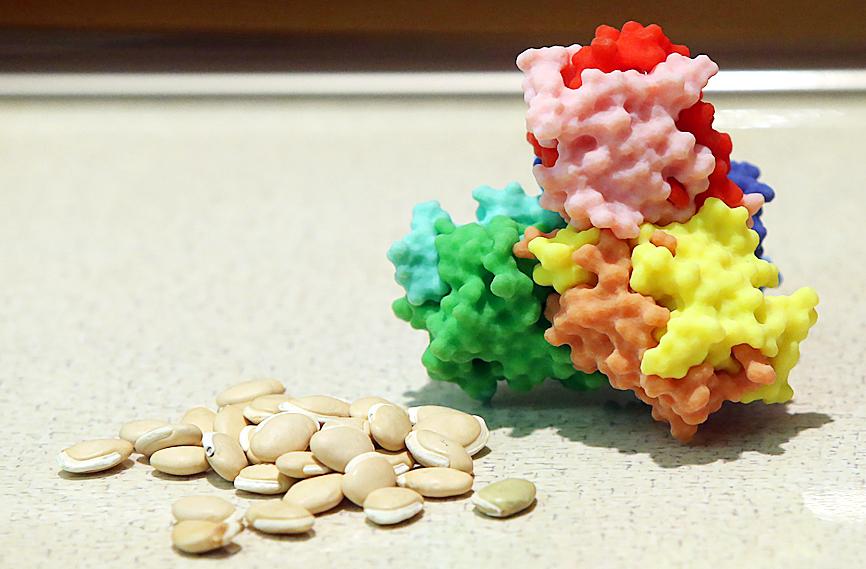A protein isolated from hyacinth beans, a medicinal herb known for centuries, has been found to restrict the activities of SARS-CoV-2 and influenza viruses in laboratory experiments, a team of Academia Sinica researchers said yesterday.
The beans’ curative effect is documented in the 16th-century Chinese medicine classic Compendium of Materia Medica (本草綱目) and they are also a food source in some countries, the Genomics Research Center’s Chemical Biology Division Director Alex Ma (馬徹) told a news conference in Taipei.
Center senior research specialist Jan Jia-tsrong (詹家琮) experimented with up to 500 medicinal herbs to see if they could restrict influenza viruses and found the extracts of hyacinth beans to be the most effective, Ma said.

Photo: CNA
The researchers have since 2016 been working to identify the plant’s critical ingredient that has anti-virus effect and found it to be flt3-receptor interacting lectin (FRIL), a protein extracted from the plant’s beans, he said.
“Previous studies suggested FRIL could foster the growth of stem cells. We are surprised to find it could also restrict virus growth,” Ma said, adding that the team’s paper is the world’s first to confirm the protein’s antivirus effect.
Shaped like a tetrapod wave breaker, FRIL can bind to glycoproteins on the envelopes of influenza viruses and coronaviruses with its protruding points, he said.
The hemagglutinin protein on the surface of influenza viruses and on coronavirus spikes mediate the virus’ entry into the cell, he added.
In laboratory experiments, nearly 70 percent of laboratory mice that had received intranasal administration of FRIL survived the deadly H1N1 influenza virus strain, while those without the protection died in eight days, Ma said.
The protein is effective in curbing infections of 11 influenza strains, he added.
From April, the researchers also applied FRIL on cells infected by the coronavirus strain hCoV-19/Taiwan/NTU04/2020, provided by National Taiwan University and the Centers for Disease Control, and the protein effectively neutralized the virus, Ma said.
Experiments on laboratory mice using FRIL to treat coronavirus infections are not yet concluded, he said.
Despite the exciting results, Ma said there is still a long way to go before the findings could be used in clinical practices.
Their study, titled “A carbohydrate-binding protein from the edible Lablab beans effectively blocks the infections of influenza viruses and SARS-CoV-2” was published in the journal Cell Reports last week.
Former Academia Sinica president Wong Chi-huey (翁啟惠), Academia Sinica Cryo-EM Center Co-director Ho Meng-chiao (何孟樵) and research scientist Wu Yi-min (吳逸民) also contributed to the paper.

The brilliant blue waters, thick foliage and bucolic atmosphere on this seemingly idyllic archipelago deep in the Pacific Ocean belie the key role it now plays in a titanic geopolitical struggle. Palau is again on the front line as China, and the US and its allies prepare their forces in an intensifying contest for control over the Asia-Pacific region. The democratic nation of just 17,000 people hosts US-controlled airstrips and soon-to-be-completed radar installations that the US military describes as “critical” to monitoring vast swathes of water and airspace. It is also a key piece of the second island chain, a string of

A magnitude 5.9 earthquake that struck about 33km off the coast of Hualien City was the "main shock" in a series of quakes in the area, with aftershocks expected over the next three days, the Central Weather Administration (CWA) said yesterday. Prior to the magnitude 5.9 quake shaking most of Taiwan at 6:53pm yesterday, six other earthquakes stronger than a magnitude of 4, starting with a magnitude 5.5 quake at 6:09pm, occurred in the area. CWA Seismological Center Director Wu Chien-fu (吳健富) confirmed that the quakes were all part of the same series and that the magnitude 5.5 temblor was

The Central Weather Administration has issued a heat alert for southeastern Taiwan, warning of temperatures as high as 36°C today, while alerting some coastal areas of strong winds later in the day. Kaohsiung’s Neimen District (內門) and Pingtung County’s Neipu Township (內埔) are under an orange heat alert, which warns of temperatures as high as 36°C for three consecutive days, the CWA said, citing southwest winds. The heat would also extend to Tainan’s Nansi (楠西) and Yujing (玉井) districts, as well as Pingtung’s Gaoshu (高樹), Yanpu (鹽埔) and Majia (瑪家) townships, it said, forecasting highs of up to 36°C in those areas

IN FULL SWING: Recall drives against lawmakers in Hualien, Taoyuan and Hsinchu have reached the second-stage threshold, the campaigners said Campaigners in a recall petition against Chinese Nationalist Party (KMT) Legislator Yen Kuan-heng (顏寬恒) in Taichung yesterday said their signature target is within sight, and that they need a big push to collect about 500 more signatures from locals to reach the second-stage threshold. Recall campaigns against KMT lawmakers Johnny Chiang (江啟臣), Yang Chiung-ying (楊瓊瓔) and Lo Ting-wei (羅廷瑋) are also close to the 10 percent threshold, and campaigners are mounting a final push this week. They need about 800 signatures against Chiang and about 2,000 against Yang. Campaigners seeking to recall Lo said they had reached the threshold figure over the